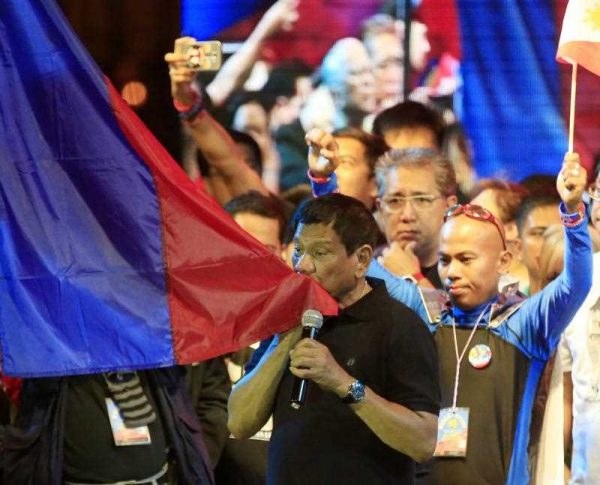Women’s groups who filed a complaint over the incident before the Commission on Human Rights were on the receiving end of the second statement. The last was directed at a senator who recently levelled charges of undeclared wealth against Duterte. If these statements are any indication of what the Philippines should expect from a Duterte presidency, then the country is headed for dire straits.
Regardless of who wins, the Philippines may find itself in a maelstrom after its 16th presidential election on 9 May. The current race has the highest-ever number of candidates in contention. The two candidates dubbed as most likely to win, Duterte and Senator Grace Poe, consistently generate a small plurality of support, while the next two, Vice President Jejomar Binay and former Interior Secretary Mar Roxas, claim they can mobilise millions of votes.
Philippine elections have been unusual by international standards from the start. The most unusual attribute of Philippine elections is the persistently high voter turnout. Voter turnout hit 90 per cent in the first elections after the transition to democracy in 1986, and hovered above the 75 per cent mark in the following four presidential elections. Although voter turnout in other countries with voluntary voting systems has declined over time, it remains high in the Philippines to this day.
Another atypical element of Philippine elections is an absence of firm political alignments. In the current race, only one party, the Liberal Party of President Benigno S. Aquino III has a complete slate of electoral candidates. The other presidential candidates have included in their rosters ‘shared’ candidates, who are affiliated with multiple presidential hopefuls. The current leading contender, Duterte, did not even bother to produce a slate of his own senatorial candidates at all.
This can be explained by the absence of firm political parties. Without parties, alignments are subject to discussions among just a few leaders. They accommodate candidates who may have jumped ship from one party to another, as well as those who label themselves as independents. Due to these temporary and shaky alliances, national candidates who rely on the capacity of their local allies to mobilise voters may find such hopes seriously misplaced.
This election, the campaign narratives of most candidates have been dominated by questions of character rather than policy. The early frontrunner, incumbent Vice President Jejomar Binay, with his slogan of Kay Binay, Gaganda ang buhay (With Binay, life will be better/more beautiful), saw his pre-election support dwindling in light of serious corruption allegations. Questions regarding the citizenship of another popular candidate, Senator Grace Poe, deflected attention away from her slogan of Gobyernong May Puso (Government with Heart) and was played up by her opponents as an indication of her weak allegiance to the nation. Administration candidate Manuel ‘Mar’ Roxas, running on the promise to continue the ‘straight path’ (daang matuwid) of the outgoing president has been held back by criticisms of his indecisiveness.
By his own admission, the current frontrunner, Duterte, has many flaws and contradictions. Yet despite being accused of womanising and human rights violations during his time as mayor of Davao City, this has not significantly affected his popularity. Unfortunately for his opponents, Duterte jumped the gun on them by declaring these flaws during his proclamation rally. Duterte continues to hold more than a third of the popular vote.
The recent charges of undeclared wealth could cast doubts on one key character trait that has endeared Duterte to his supporters: his honesty. But this would depend on his main accuser, incumbent Senator and vice presidential candidate, Sonny Trillanes, presenting substantive evidence to the public. It is also uncertain that other candidates would benefit from any drop in Duterte’s support if disgruntled former Duterte supporters simply abstain from voting.
The most recent pre-election poll has Duterte ahead by 11 percentage points. The difference between him and the predicted second place runner, Mar Roxas, is more than four million votes. Whether the other contenders can bridge this gap will depend on mobilising votes in three key high-voting areas: the National Capital Region and the proximate regions of Central and Southern Luzon. These three regions account for almost 40 per cent of the total voting population in the country. From the outset of the 2016 presidential race, they have been battleground areas where a sizeable plurality of votes could offset strong votes in candidates’ home regions.
Duterte’s opponents will take every measure necessary to court more support until election day. After the elections, the losing contenders will likely pose a constant challenge to the new administration. Whatever the outcome, the Philippines is bound for a difficult post-election scenario.
Ronnie Holmes is President of public opinion research firm Pulse Asia and a PhD candidate in the Department of Political and Social Change at the Coral Bell School of Asia Pacific Affairs, The Australian National University.

